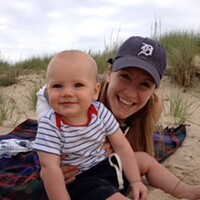Mayim Bialik: Breastfeeding defender, obesity fighter
Loading...
Actress Mayim Bialik spoke in a HuffPost LIVE interview on Monday to once again defend breastfeeding and her attachment parenting lifestyle.
During the interview, Bialik recounted a 2011 incident on the New York City subway, during which she breastfed her 3-year-old son.
Ms. Bialik told HuffPost, “What I like to point out is that was the best way for that subway ride to be pleasant for everyone.” She later added "I don't believe you need to cover up a baby eating anymore than you need to cover a baby drinking a bottle."
Bialik also declared during the interview that breastfeeding is “NOT a sexual act.”
Bialik is an actress and neuroscientist. She's currently playing Dr. Amy Farrah Fowler on CBS's Big Bang Theory.
Her defense of breastfeeding her own children into toddlerhood comes as the US reports a marked drop in child obesity rates for pre-school age children.
Breastfeeding children beyond the age of six months has been identified as one of the potential reasons for the obesity drop.
A government report released Tuesday showed that the obesity rate among children 2 to 5-years-old dropped by nearly half over a decade, from 14 percent to 8 percent.
According to government figures, some researchers believe breastfeeding helps children regulate their intake of food, helping to lower their obesity risk later in life.
Of infants born in 2010, 49 percent were breastfeeding at 6 months, up from 35 percent in 2000. The breast-feeding rate at 12 months increased from 16 percent to 27 percent during that time period.
Judy Dodd, a University of Pittsburgh assistant professor in nutrition and dietetics, told the Associated Press that government programs and other services have encouraged breast-feeding by providing free or low-cost breast pumps, access to refrigeration and more offices with private, comfortable rooms where new moms can pump on the job.
"When a woman goes back to work, how does she continue to breast-feed? That's the biggest challenge I'm hearing, and there have been improvements," Ms. Dodd said.
Material from the Associated Press was used in this report.






